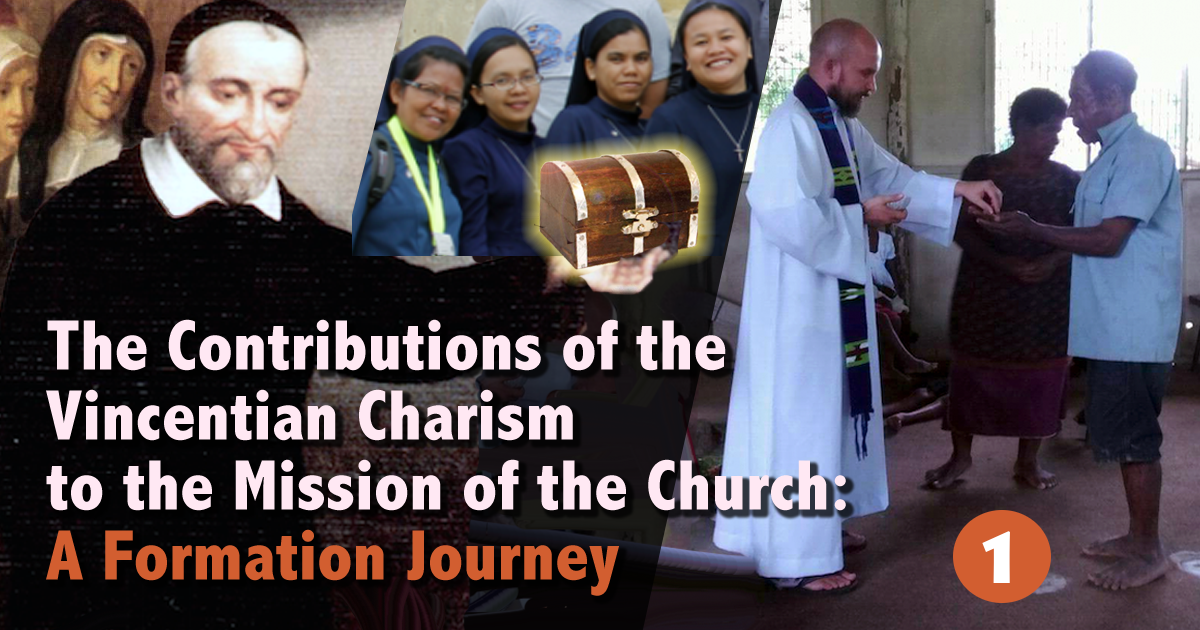This is the first of a series of formation packages meant for individual or group study which was introduced last week in “The Contributions of the Vincentian Charism to the Mission of the Church: A Formation Journey.” In that article, we also suggested a “Lesson Plan” for use in groups.

A New Reality is Born
In his introduction to “The Contributions of the Vincentian Charism to the Mission of the Church,” Fr. Corpus Delgado instructs us about a new reality that St. Vincent de Paul introduced to the Church.
Many of us take church law for granted. Yet it has undergone very significant changes especially regarding what people regard as “religious life.” Sisters, for the most part, live in convents or small houses rather than monasteries. The vast majority of sisters are engaged in some form of active ministry.
It was not always so. Prior to the time of Vincent, the only way women could dedicate their lives to God was in monastery-like convents very closely governed. By church law, they were “nuns” and not allowed outside these convents to teach or serve as nurses. The great St. Francis de Sales tried to change this but failed.
It was Vincent who succeeded when he insisted that the Daughters take private vows renewed annually so that they would not fall under the church laws for religious women.
It took centuries for this new form of religious life to be written into Church law in a special section Societies of Apostolic Life, and for a new reality of life to emerge.
Today we take for granted that women are actively engaged in health care, whether on the front lines in our cities or as nurses on battlefields as they did in the Civil War in the United States and wars in other countries.
A New Canonical reality
Father Delgado writes in his first section that the various Vincentian establishments provided a canonical opening.
He describes a new reality and the new form of religious life of the Daughters of Charity:
They shall bear in mind that they do not belong to a religious Order because that state is incompatible with the duties of their vocation … having for monastery only the houses of the sick and the place where the Superioress resides; for cell, a hired room; for chapel, the parish church; for cloister, the streets of the city; for enclosure, obedience, with an obligation to go nowhere but to the houses of the sick or to places necessary for their service; for grille, the fear of God; for veil holy modesty; making no other profession to ensure their vocation and that, by their constant trust in Divine Providence and the offering they make to God of all that they are and of their service in the person of the poor [4].
St. Louise de Marillac maintained this distinction of the Daughters of Charity – that of not being like the religious communities of the day – but was careful to insist that this was not a lax form of life! Delgado cites St. Louise,
The Daughters of Charity are obliged, therefore, to strive to become more holy than religious (SWLM:645 [L.627]).
Vincent also describes the ministry of the Daughters of Charity as truly “apostolic”: of equal value and character to the ministry conducted by their “brothers” in the Congregation of the Mission. This revolutionary idea would eventually transform the character and form of religious life.
This truly pioneering spirit provided the “canonical opening” for future religious life which is now the norm for apostolic religious life. A truly new reality was introduced by Saints Vincent and Louise.
Are there ways in which this breakthrough is still unfolding and echoing through the Church of today?
See you next week!
| View any or all of the Articles and SlideShares including today’s | |
| Download any or all of the SlideShares as PDF • PPTX |
We hope you’ve enjoyed this collaboration of…







0 Comments